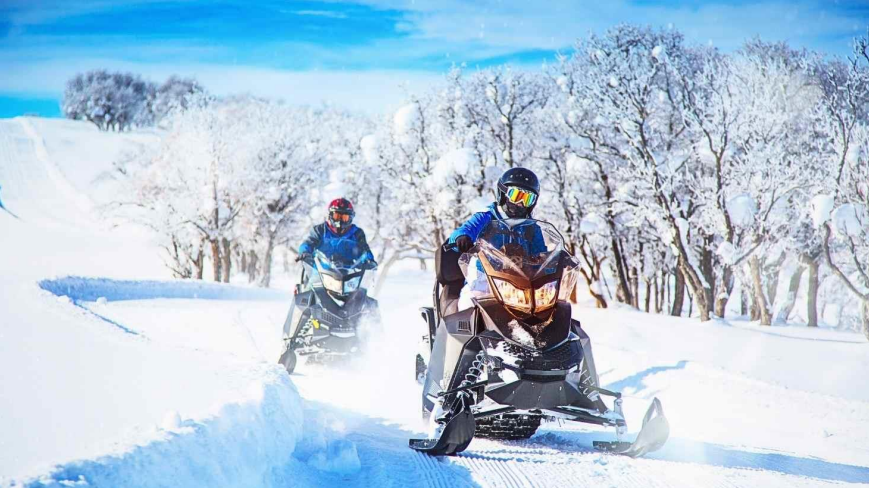Top 10 Snowmobile Laws You Need to Know in Atlantic Canada
Why Understanding Snowmobile Laws is Essential for Safe Winter Riding
Snowmobiling in New Brunswick (NB), Nova Scotia (NS), and Prince Edward Island (PEI) is a
popular winter activity, but it comes with specific rules and regulations that all snowmobilers need
to follow. Each province has its own set of laws governing snowmobile use to ensure the safety of
riders and the environment.
Below are the key laws and regulations that you need to be aware of when riding in the Maritime
provinces.
1. Mandatory Registration
In all three Maritime provinces, snowmobiles must be registered with the provincial government. In
New Brunswick, registration is managedby Service New Brunswick, and you are required to display
a valid plate and registration sticker on your vehicle.
Similarly, in Nova Scotia, snowmobiles must be registered through Access Nova Scotia, while PEI’s
Department of Transportation oversees snowmobile registrations. Registration helps ensure that
snowmobiles meet safety standards and that owners are identifiable in case of an accident.
In 2023, New Brunswick alone recorded over 22,000 registered snowmobiles, reflecting the
popularity of this winter activity. Source: Service New Brunswick
2. Insurance Requirements
In all three provinces, liability insurance is mandatory for snowmobile operation. This protects you
if you’re involved in an accident that results in injury to another person or damage to property.
In New Brunswick and Nova Scotia, the minimum required coverage is typically $200,000, though
you may want to increase this for added protection. Prince Edward Island also mandates that
snowmobile riders carry liability insurance.
Having adequate insurance is crucial for any snowmobiler, especially considering that New
Brunswick saw over 300 snowmobile-related accidents in the last decade, many involving
collisions with other vehicles or property. Source: Government of New Brunswick Accident Reports
3. Operator Age Restrictions
Each Maritime province has age restrictions for operating a snowmobile. In New Brunswick, you
must be at least 16 years old to use a snowmobile without supervision. Nova Scotia requires riders
under 16 to be accompanied by an adult, and they must have completed a safety course. In PEI,
riders as young as 14 can operate a snowmobile, provided they have completed an approved safety
course.

4. Snowmobile Operator’s Permit
To operate a snowmobile legally in New Brunswick, Nova Scotia, or PEI, you need a valid
snowmobile operator’s permit. This is obtained by completing a snowmobile safety course
approved by provincial authorities. In Nova Scotia, courses focus on responsible riding,
understanding trail signs, and environmental preservation. PEI has similar requirements and offers
online courses to meet the demand.
In Nova Scotia, over 500 riders were trained through these safety courses in 2022, which has
contributed to a noticeable decline in snowmobile accidents in recent years. Source: Access Nova
Scotia
5. Trail Pass Requirement
If you plan to use maintained trails, you’ll need to purchase a trail pass in all three provinces. New
Brunswick requires riders to have a trail permit issued by the New Brunswick Federation of
Snowmobile Clubs (NBFSC), while Nova Scotia and PEI also have similar permits through their
provincial snowmobile associations. These fees are used to maintain trails, ensuring they stay safe
for all users.
The NBFSC manages over 7,000 km of trails, and in 2023, trail permits contributed over $1.5 million
to the upkeep of these trails. Source: NBFSC
6. Helmet Use
Helmet laws are strict across the Maritimes, requiring all snowmobile riders and passengers to
wear an approved helmet. Helmets must meet DOT, SNELL, or ECE safety standards. This rule
applies regardless of whether you are riding on public or private property.
According to the Canadian Medical Association Journal, helmets reduce the risk of head injury by
70%, underscoring their importance in preventing severe snowmobile-related injuries. Source:
CMAJ

7. Restricted Areas and Trespassing Laws
Riders must stay on designated snowmobile trails or other areas where snowmobiling is permitted.
Trespassing on private property without permission is illegal in all three provinces. In Nova Scotia,
snowmobilers are restricted from using certain environmentally sensitive areas, and fines for
trespassing can range from $250 to $2,000.Nova Scotia has seen a 15% increase in fines for trespassing on private lands, particularly in regions where snowmobile use has led to environmental degradation. Source: Government of Nova Scotia
8. Speed Limits
Each province sets specific speed limits for snowmobiles. In New Brunswick, the maximum speed
is typically 50 km/h on groomed trails and 80 km/h in open areas. Nova Scotia and PEI have similar
speed limits, but riders should be aware that these can vary depending on weather conditions and
trail signage.
Excessive speed has been cited as a major factor in 40% of snowmobile accidents across the
Maritimes, according to the New Brunswick Federation of Snowmobile Clubs. Source: NBFSC
9. Impaired Operation Laws
Operating a snowmobile while under the influence of alcohol or drugs is illegal across all three
provinces and carries the same penalties as impaired driving in a motor vehicle. In Nova Scotia,
anyone caught running a snowmobile under the influence can face immediate suspension of their
operator’s permit and hefty fines, with possible jail time for repeat offenders.
In PEI, the provincial government reported that 15% of all snowmobile accidents in 2022 involved
alcohol, prompting increased enforcement of impaired driving laws on trails. Source: PEI
Government
10. Environmental Protection Laws
Snowmobilers are required to respect the environment by avoiding protected areas, wetlands, and
other sensitive ecosystems. In Nova Scotia, riders must follow specific routes that minimize
environmental impact, and fines can be issued for damaging flora or wildlife habitats.
The Canadian Parks and Wilderness Society has highlighted the need for responsible snowmobile
practices, as some regions of the Maritimes have seen habitat degradation due to improper
snowmobile use. Source: CPAWS
Following these laws will help ensure a safe and enjoyable snowmobiling experience in the
Maritime provinces. Make sure to stay informed about provincial regulations, as they are designed
to protect both you and the environment. By understanding the legal requirements, you can avoid
fines and accidents while making the most of the snowy trails.
Helping Injured Clients
For over 35 years, CLG Injury Lawyers have helped thousands of injured clients. We fight for your rights to receive the maximum compensation you deserve. Providing you the Peace of Mind to focus on your Road to Recovery. Our experienced personal injury lawyers offer a free, no obligation case evaluation.
For more articles and safety tips, go to https://clginjurylaw.ca/blog/ or subscribe to our newsletter.







